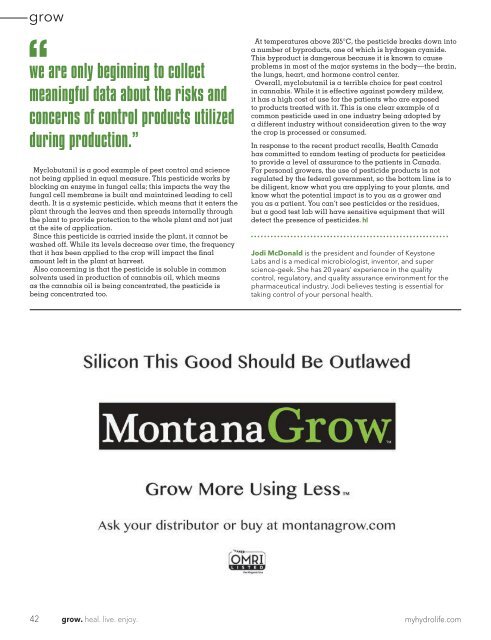Hydrolife Magazine April/May 2017 (USA Edition)
To know where you’re going, you have to know where you’ve been. The same adage rings true for the modern cannabis industry, which is why this issue of Hydrolife takes a look back at the roots of marijuana and how the plant has traveled through history (History of Cannabis Part II), as well as how the industry may be affected by recent political appointments (Should the Cannabis Industry be Worried?)
To know where you’re going, you have to know where you’ve been. The same adage rings true for the modern cannabis industry, which is why this issue of Hydrolife takes a look back at the roots of marijuana and how the plant has traveled through history (History of Cannabis Part II), as well as how the industry may be affected by recent political appointments (Should the Cannabis Industry be Worried?)
Create successful ePaper yourself
Turn your PDF publications into a flip-book with our unique Google optimized e-Paper software.
grow<br />
“<br />
we are only beginning to collect<br />
meaningful data about the risks and<br />
concerns of control products utilized<br />
during production.”<br />
Myclobutanil is a good example of pest control and science<br />
not being applied in equal measure. This pesticide works by<br />
blocking an enzyme in fungal cells; this impacts the way the<br />
fungal cell membrane is built and maintained leading to cell<br />
death. It is a systemic pesticide, which means that it enters the<br />
plant through the leaves and then spreads internally through<br />
the plant to provide protection to the whole plant and not just<br />
at the site of application.<br />
Since this pesticide is carried inside the plant, it cannot be<br />
washed off. While its levels decrease over time, the frequency<br />
that it has been applied to the crop will impact the final<br />
amount left in the plant at harvest.<br />
Also concerning is that the pesticide is soluble in common<br />
solvents used in production of cannabis oil, which means<br />
as the cannabis oil is being concentrated, the pesticide is<br />
being concentrated too.<br />
At temperatures above 205°C, the pesticide breaks down into<br />
a number of byproducts, one of which is hydrogen cyanide.<br />
This byproduct is dangerous because it is known to cause<br />
problems in most of the major systems in the body—the brain,<br />
the lungs, heart, and hormone control center.<br />
Overall, myclobutanil is a terrible choice for pest control<br />
in cannabis. While it is effective against powdery mildew,<br />
it has a high cost of use for the patients who are exposed<br />
to products treated with it. This is one clear example of a<br />
common pesticide used in one industry being adopted by<br />
a different industry without consideration given to the way<br />
the crop is processed or consumed.<br />
In response to the recent product recalls, Health Canada<br />
has committed to random testing of products for pesticides<br />
to provide a level of assurance to the patients in Canada.<br />
For personal growers, the use of pesticide products is not<br />
regulated by the federal government, so the bottom line is to<br />
be diligent, know what you are applying to your plants, and<br />
know what the potential impact is to you as a grower and<br />
you as a patient. You can’t see pesticides or the residues,<br />
but a good test lab will have sensitive equipment that will<br />
detect the presence of pesticides.<br />
Jodi McDonald is the president and founder of Keystone<br />
Labs and is a medical microbiologist, inventor, and super<br />
science-geek. She has 20 years’ experience in the quality<br />
control, regulatory, and quality assurance environment for the<br />
pharmaceutical industry. Jodi believes testing is essential for<br />
taking control of your personal health.<br />
42<br />
grow. heal. live. enjoy.<br />
myhydrolife.com




![Hydrolife Magazine December 2017/January 2018 [CANADIAN EDITION]](https://img.yumpu.com/59790088/1/190x247/hydrolife-magazine-december-2017-january-2018-canadian-edition.jpg?quality=85)
![Hydrolife Magazine December 2017/January 2018 [USA EDITION]](https://img.yumpu.com/59790042/1/190x247/hydrolife-magazine-december-2017-january-2018-usa-edition.jpg?quality=85)
![Hydrolife Magazine October/November 2017 [Canada Edition]](https://img.yumpu.com/59493562/1/190x247/hydrolife-magazine-october-november-2017-canada-edition.jpg?quality=85)
![Hydrolife Magazine October/November 2017 [USA Edition]](https://img.yumpu.com/59493548/1/190x247/hydrolife-magazine-october-november-2017-usa-edition.jpg?quality=85)
![Hydrolife Magazine August/September 2017 [USA Edition]](https://img.yumpu.com/59236656/1/190x247/hydrolife-magazine-august-september-2017-usa-edition.jpg?quality=85)








